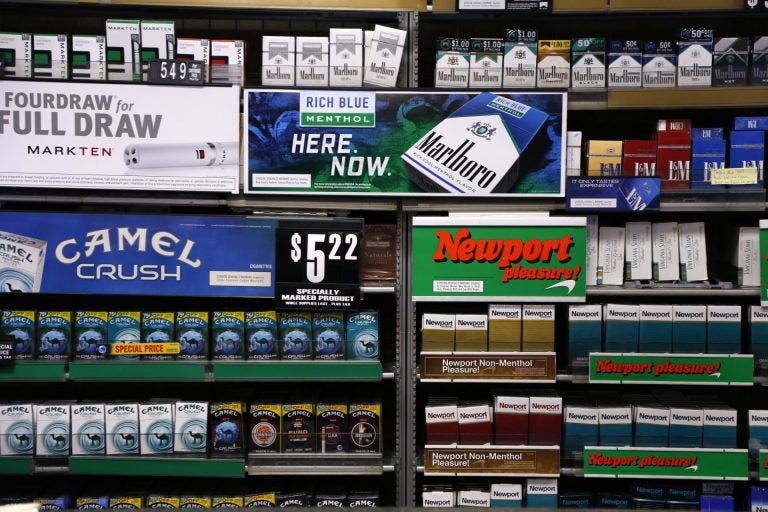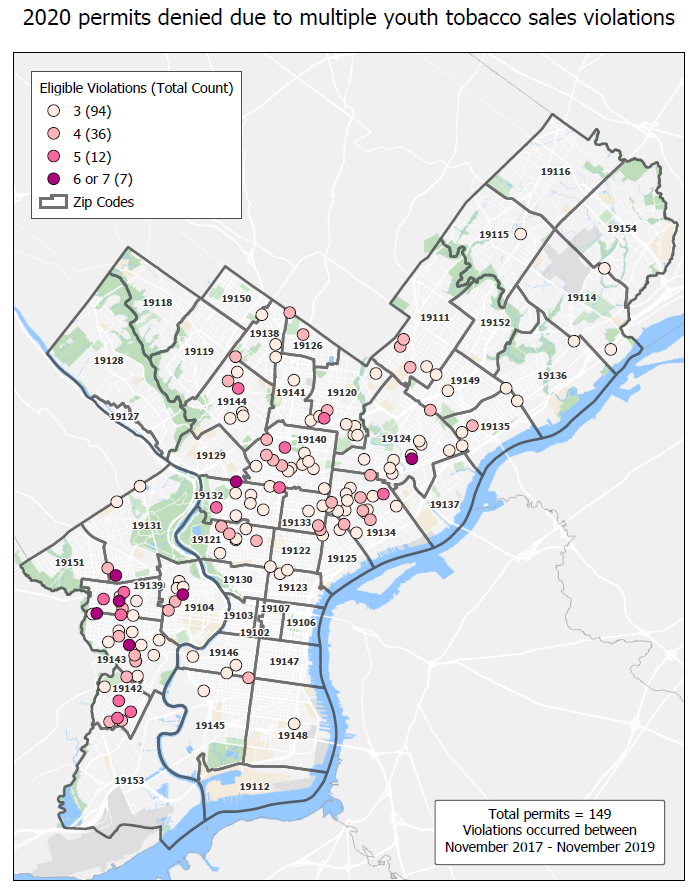Philly health department busts 149 tobacco retailers for selling to kids
Permits will be revoked at businesses that sold to minors at least 3 times in the past 2 years. Philadelphia has the highest smoking rate of any U.S. city.

In this 2015 photo, several brands of cigarettes are on display. (Gene J. Puskar/AP Photo)
The city health department will not renew tobacco sale permits for 149 retailers throughout Philadelphia that sold cigarettes to minors.
All the retailers whose permits will be revoked sold to minors at least three times over the past two years. They represent 6% of the city’s roughly 2,600 tobacco retailers, which include restaurants, hookah bars, vape shops, laundromats, gas stations and convenience stores.
Smoking led to an estimated 3,844 deaths in 2016, accounting for 28.7% of all deaths in the city, making it the leading cause of death in Philadelphia. Almost 80% of smokers nationwide report starting before they turned 18 years old.
“Our concern is for the health of our children, and these stores have repeatedly been guilty of this violation,” Health Commissioner Tom Farley said.

In 2016, Philadelphia had the highest smoking rate of any major city in the country at 23%, and twice as many tobacco retailers per capita. To try to reduce those rates, the city approved regulations that capped the number of retailers in each planning district, and denied tobacco sales licenses to any retailer caught selling to minors more than three times in 24 months. The regulations went into effect the following year, and the city started counting violations in 2018.
By the time licenses were up for renewal in January 2019, four stores had reached the threshold. This year, 149 reached it.
To catch violators, the city sends young mystery shoppers to retailers to try to buy cigarettes. The city partners with the nonprofit Health Promotion Council to recruit and pay teen shoppers between 15 and 17, all of whom attempt to buy cigarettes. The teens are accompanied by adult chaperones.
The health department said tobacco retailers were made aware of the new regulations and their more drastic consequences immediately after they were approved, via a mailing in five different languages. An email reminder was also sent in Spring 2019.
Still, some small-business owners said they were blindsided by the news that three tickets in two years would mean a loss of their tobacco sales permits.
Parmenio Almonte, who has owned and operated V and S Supermarket at 11th and Poplar streets for the past three years, only found out his tobacco permit was being denied when he went to renew it.
“I didn’t know that,” said Almonte, who is Dominican and spoke through his wife, Khelia Valle, as an interpreter. “90% of small business didn’t know that.”
Almonte knew he’d gotten tickets, but he felt they were unjust and said the city’s process made it hard to contest them. He received notice of his first violation two weeks after the alleged sale to a minor occurred, making it impossible to fight because he had already deleted his surveillance footage, required for evidence.
He said he was able to contest a second ticket in court, and that even though he supplied video footage proving his cashier did not in fact sell to a minor, the city wouldn’t drop the ticket because he didn’t have additional footage showing the exterior of the building, proving the incident took place in his bodega.
Valle added that during the appeals process, no one told them that they were in danger of having their tobacco permit revoked.
Almonte takes full responsibility for the third violation but said he doesn’t think that should cause him to lose his permit. He’s worried about the damage it will do to his business.
“Clients come in to buy a pack of cigarettes, and they’ll in turn by soda, hoagies, it might be a spur-of-the-moment buying,” he said. “If the client knows that if they can go to our store and they’re not able to get cigarettes and they have a list of things they need including cigarettes, they might go somewhere else where they can get everything that they need, as opposed to just one or two things.”
Almonte said he estimated he’d lose 60% of his business as a result of not being allowed to sell tobacco, and that he thought the resale value of his store would be about half what it would be with a tobacco permit. He was frustrated with what he viewed as another penalty on small-business owners, on top of the soda tax and impending plastic bag tax.
Farley, the city health commissioner, said of the retailers, “Every time they got a ticket, they got an education in person that if they continued to sell these killer products to children, they’re going to lose their sales privileges. I don’t think they deserve to continue to be allowed to sell.”
Almonte and Valle said no one ever came for such an educational effort. They are appealing the city’s decision and have considered opening a business outside of Philadelphia.
Most of the stores whose licenses will not be renewed are in low-income areas with high concentrations of Black and Latino residents.
“I don’t think it’s fair that kids in low-income neighborhoods really should be getting that access to that killer product where we’re able to protect more of the kids in high-income neighborhoods,” Farley said.
The retailers were warned every time they were caught selling to minors, he said.
According to city data, tobacco retailer density per capita in low-income areas is 69% higher than in high-income areas. The smoking rate in Philadelphia is highest among Latinos, 1 in 3 of whom smoke, according to city data.
If retailers that lose their licenses wait two years, they can apply for tobacco sales permits again. But since the 2017 regulations placed a cap on tobacco retailers in each city planning district, a store would be added to a waiting list if the cap in that district has already been reached.
The American Cancer Society reported Wednesday that the largest drop in cancer mortality on record in a single period in the United States was recorded between 2016 and 2017. Researchers say it appears to be driven by declines in lung cancer mortality.
Philly still has the highest smoking rate of any major city in the country, but the smoking rate reached an all-time low in 2019 at 19%. Smoking rates are also the lowest they’ve ever been among Philadelphia teens — 2% reported smoking in 2019, and 7% reported vaping.
Philadelphia City Council recently banned all flavored vaping products and products with high nicotine concentrations from stores where minors are allowed to shop. Shortly afterward, the federal government also banned most flavored vaping products. Many advocates worry that the lack of availability of vape products will lead teens addicted to nicotine to turn to cigarettes instead.
WHYY is your source for fact-based, in-depth journalism and information. As a nonprofit organization, we rely on financial support from readers like you. Please give today.





